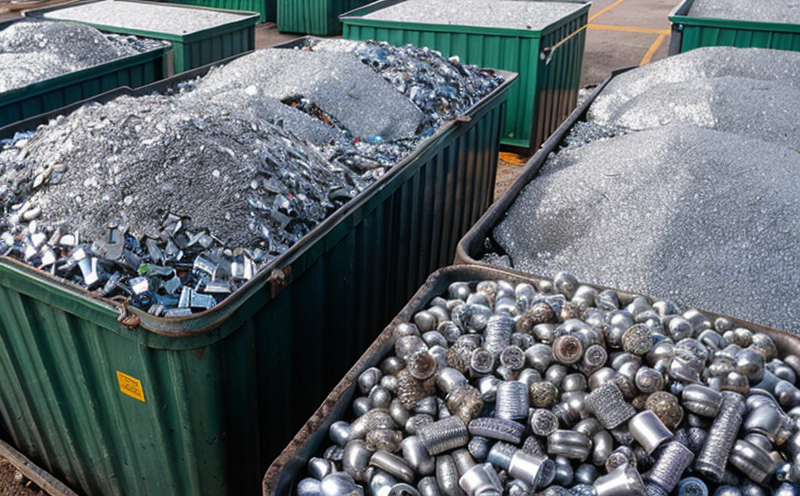EN 13921 Aluminum Scrap Contamination Determination
The European Standard EN 13921:2004 provides a standardized method for determining the contamination levels of aluminum scrap, which is crucial in ensuring that recycled materials meet the quality standards required by manufacturers and regulatory bodies. This service ensures accurate measurement and reporting of impurities such as iron, copper, magnesium, silicon, nickel, zinc, and other metals that can affect the performance and recyclability of aluminum products.
The testing process involves several key steps to ensure comprehensive analysis:
- Sample Preparation: The first step in this procedure is ensuring that the sample is representative. This includes cleaning the scrap pieces and cutting them into smaller, consistent-sized samples for accurate measurement.
- Chemical Analysis: Using precise analytical techniques like ICP-MS (Inductively Coupled Plasma Mass Spectrometry) or XRF (X-ray Fluorescence), we analyze the elements present in the aluminum scrap. These methods allow us to identify and quantify trace amounts of impurities.
- Data Interpretation: Once the chemical analysis is complete, our team interprets the data according to EN 13921 guidelines. This involves comparing the results against the specified acceptance criteria to determine if the scrap meets the required purity standards.
The importance of this service cannot be overstated, especially in industries where aluminum alloys are used extensively. For instance, automotive manufacturing relies heavily on high-quality recycled aluminum to reduce production costs and minimize environmental impact. Ensuring that the recycled material is free from harmful contaminants not only enhances product quality but also promotes sustainability.
Our team of experts ensures that every sample is tested rigorously according to EN 13921, providing accurate results that are essential for compliance with international standards. This testing method helps prevent substandard products reaching the market and supports the circular economy by ensuring only high-quality recycled materials enter the supply chain.
By adhering strictly to EN 13921, we provide a reliable service that is trusted by industry leaders worldwide. Our commitment to accuracy, precision, and adherence to international standards ensures that our clients can make informed decisions about their aluminum scrap recycling processes.
Industry Applications
- Automotive Industry: Ensuring the purity of recycled aluminum used in car components like engine blocks and body panels is critical for maintaining performance standards.
- Beverage Packaging: High-quality recycled aluminum cans are essential to retain product integrity and safety.
- Construction Sector: Aluminum scrap from construction sites can be reused, but only if it meets the specified purity levels as per EN 13921.
- Electronics Manufacturing: The electronics industry demands high-purity aluminum for various applications, including circuit boards and heat sinks.
These industries rely on our EN 13921 compliance testing to ensure that they are using only the highest quality recycled aluminum. By doing so, they not only meet regulatory requirements but also contribute positively to environmental sustainability.
Eurolab Advantages
At Eurolab, we pride ourselves on offering a comprehensive and reliable service for EN 13921 compliance testing. Our advantages include:
- ISO/IEC 17025 Accreditation: We are fully accredited to perform this testing according to international standards.
- Experienced Technical Team: Our team comprises highly skilled professionals with extensive experience in material science and recycling processes.
- State-of-the-Art Equipment: Utilizing the latest analytical instruments ensures accurate and consistent results.
- Dedicated Reporting: We provide detailed reports that are easy to understand and use for decision-making purposes.
Our commitment to excellence is reflected in every aspect of our service, ensuring that our clients receive reliable data they can trust. This not only helps them comply with regulations but also enhances their reputation as responsible stewards of the environment.
Quality and Reliability Assurance
Eurolab takes quality and reliability assurance very seriously. Our commitment to these principles is evident in our approach to EN 13921 testing:
- Method Validation: Before implementing a new test method, we validate it against existing literature and international standards.
- Regular Calibration: All analytical instruments are regularly calibrated to ensure accuracy.
- Duplicate Testing: Each sample undergoes duplicate testing to verify the consistency of results.
- Data Verification: Our data verification processes include cross-referencing with other tests and industry benchmarks.
By maintaining high standards throughout our process, we ensure that every report issued is accurate, reliable, and meets the highest quality expectations. This commitment to excellence has earned us a reputation as a trusted partner for metal recycling testing.





